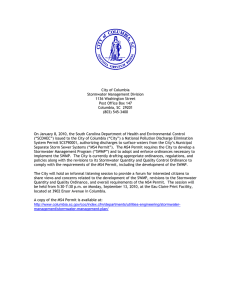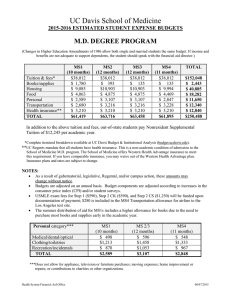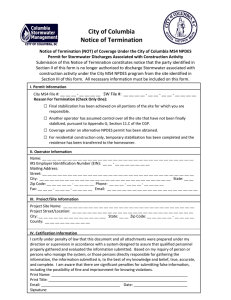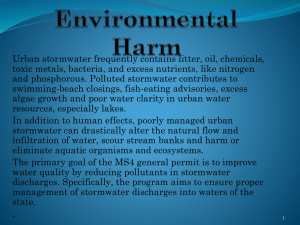Angelo State University
advertisement
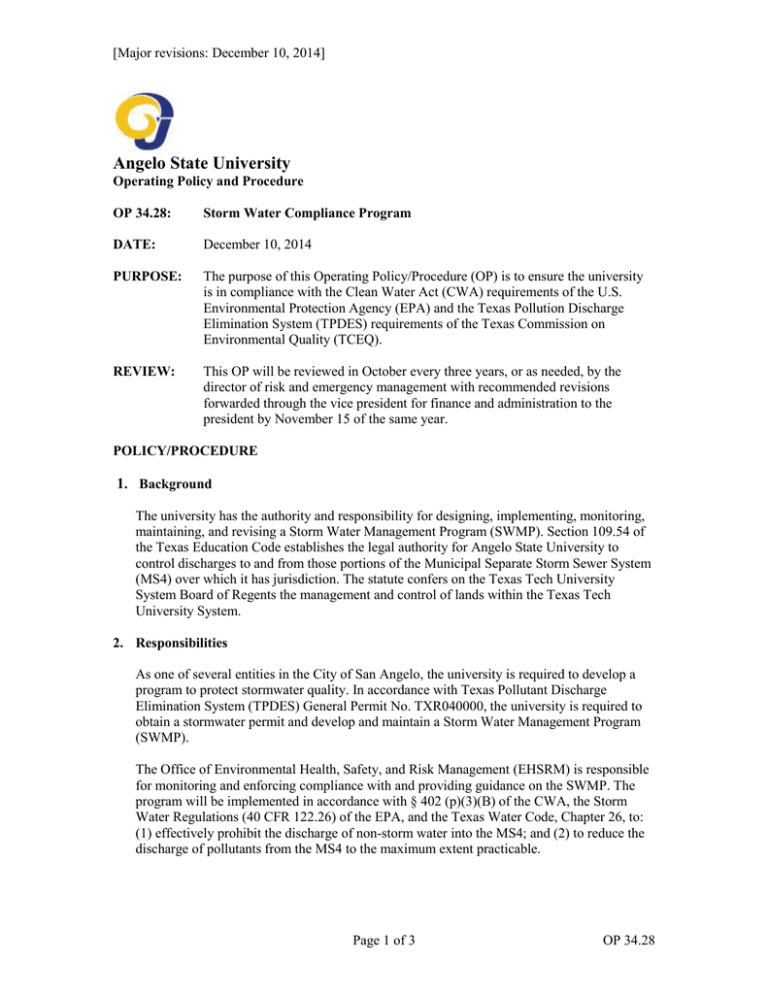
[Major revisions: December 10, 2014] Angelo State University Operating Policy and Procedure OP 34.28: Storm Water Compliance Program DATE: December 10, 2014 PURPOSE: The purpose of this Operating Policy/Procedure (OP) is to ensure the university is in compliance with the Clean Water Act (CWA) requirements of the U.S. Environmental Protection Agency (EPA) and the Texas Pollution Discharge Elimination System (TPDES) requirements of the Texas Commission on Environmental Quality (TCEQ). REVIEW: This OP will be reviewed in October every three years, or as needed, by the director of risk and emergency management with recommended revisions forwarded through the vice president for finance and administration to the president by November 15 of the same year. POLICY/PROCEDURE 1. Background The university has the authority and responsibility for designing, implementing, monitoring, maintaining, and revising a Storm Water Management Program (SWMP). Section 109.54 of the Texas Education Code establishes the legal authority for Angelo State University to control discharges to and from those portions of the Municipal Separate Storm Sewer System (MS4) over which it has jurisdiction. The statute confers on the Texas Tech University System Board of Regents the management and control of lands within the Texas Tech University System. 2. Responsibilities As one of several entities in the City of San Angelo, the university is required to develop a program to protect stormwater quality. In accordance with Texas Pollutant Discharge Elimination System (TPDES) General Permit No. TXR040000, the university is required to obtain a stormwater permit and develop and maintain a Storm Water Management Program (SWMP). The Office of Environmental Health, Safety, and Risk Management (EHSRM) is responsible for monitoring and enforcing compliance with and providing guidance on the SWMP. The program will be implemented in accordance with § 402 (p)(3)(B) of the CWA, the Storm Water Regulations (40 CFR 122.26) of the EPA, and the Texas Water Code, Chapter 26, to: (1) effectively prohibit the discharge of non-storm water into the MS4; and (2) to reduce the discharge of pollutants from the MS4 to the maximum extent practicable. Page 1 of 3 OP 34.28 [Major revisions: December 10, 2014] 3. Program Requirements The SWMP must describe the best management practices (BMPs) the university will implement to minimize the discharge of pollutants from the MS4 to the maximum extent practicable. The minimum control measures (MCMs) defined by the TCEQ that are applicable to Angelo State University are as follows: a. Public Education, Outreach, and Involvement – The MS4 is required to develop, implement, and maintain a public education and outreach program to distribute information to the community about impacts of stormwater discharges on water quality, the hazards associated with illegal discharges and the improper disposal of waste, and steps the public can take to reduce pollutants in stormwater runoff. In addition, the MS4 operator must implement a public involvement/participation program to include opportunities for constituents within the MS4 area to participate in the SWMP development and implementation. b. Illicit Discharge Detection and Elimination – The MS4 must develop, implement, and enforce a program to detect and eliminate illicit discharges. As part of this program, the MS4 must develop a storm sewer system map with locations of all outfalls, establish an ordinance (or other regulatory mechanism) prohibiting illicit discharges, establish enforcement procedures and actions, detect and address illicit discharges (including illegal dumping), and inform employees, businesses, and the general public of the program. c. Construction Site Stormwater Runoff Control – The MS4 is required to develop, implement, and enforce a program to reduce pollutants in any stormwater runoff to the small MS4 from construction activities disturbing greater than or equal to one acre of land (including smaller sites that are part of a larger common plan of development), through the development of an ordinance (or other regulatory mechanism) to require erosion and sediment controls, as well as sanctions to ensure compliance, and procedures for site plan and public comment review. The MS4 must also require construction site operators to implement erosion and sediment control BMPs and to control waste. d. Post-construction Stormwater Management in New Development and Redevelopment – The MS4 is required to develop, implement, and enforce a program to address stormwater runoff from new development and redevelopment projects that disturb greater than or equal to one acre of land (including smaller sites that are part of a larger common plan of development), through the development of an ordinance (or other regulatory mechanism) to address post-construction runoff, the development and implementation of structural and non-structural BMPs appropriate to the community, and procedures to ensure adequate long-term operation and maintenance. e. Pollution Prevention and Good Housekeeping for Municipal Operations – The MS4 is required to develop and implement an operation and maintenance program that has the goal of preventing or reducing pollutant runoff from municipal operations. f. The university is also required to obtain a TPDES general permit TXR150000 for each construction activity that results in a land disturbance of greater than or equal to one acre. The Office of Facilities Planning and Construction (FP&C) is responsible for coordinating and enforcing applicable construction permit requirements to reduce pollutants in any stormwater runoff to the MS4 from construction activities. Page 2 of 3 OP 34.28 [Major revisions: December 10, 2014] The complete SWMP and water quality education materials are posted on the EHSRM website. All interpretations regarding application of the storm water permit criteria and acceptable practices for meeting the permit requirements will be made by EHSRM. Page 3 of 3 OP 34.28
